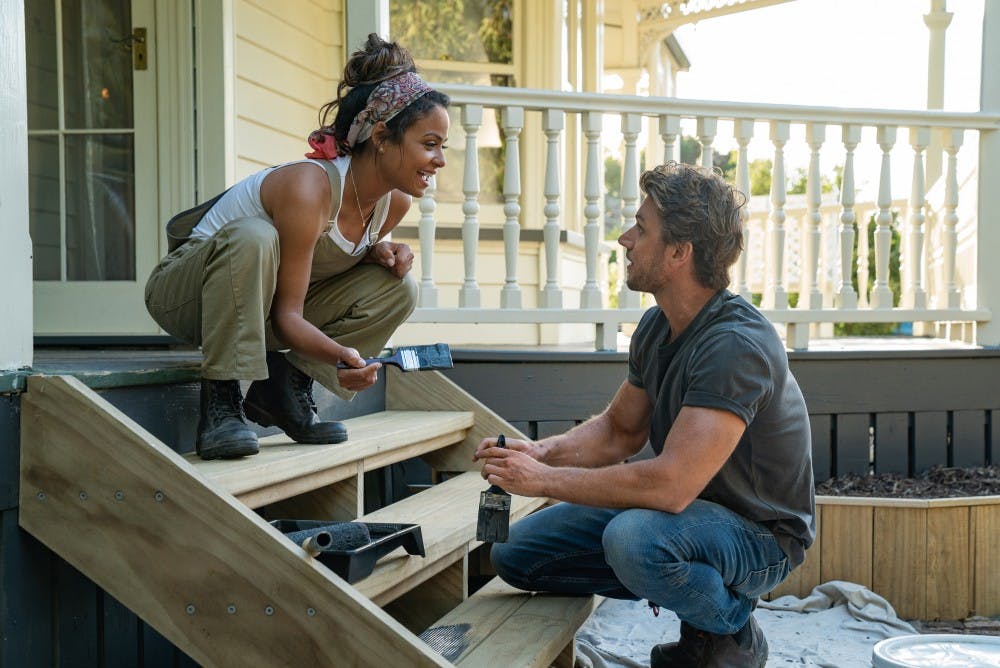Falling Inn Love is as unwatchable as it is cliché. Now, there’s nothing wrong with cliché—when done properly, it gives us exciting superhero movies and classic romantic comedies. Falling Inn Love, however, takes every unoriginal platitude and ruins it. At best, this is frustrating. At worst, it enforces toxic gender roles in the workspace and in romantic relationships.
Gabriela Diaz (Christina Milian) is a successful woman working at a corporate design firm. She seems to have it all, until the moment the firm collapses and she breaks up with her boyfriend because he won’t fully commit to her. The break–up is awkward—when he explains his reason for needing personal space, she shakes her head with an incongruously wide smile painted on her face, tells him she can’t be in the relationship anymore, and walks away, the strange smile still plastered on her face. He looks after her, calling her name a couple times before calling it quits. The poor script and acting make this moment bizarre.
Gabriela’s firm shuts down soon afterwards, and she feels that her life is falling apart. She then decides to move all the way to New Zealand because an online ad promises a beautiful, free home (a move that feels naive and slightly dangerous). Of course, the house turns out to be old and decrepit. As Gabriela explores the house at night, it feels like the stage is being set for a grisly horror movie instead of an upbeat romantic comedy. The only thing that saves the moment is the cheerful music continuously playing in the background.
Gabriela heads into town shortly afterwards to begin the process of renovating the inn. She meets Peter (Jonathan Martin) and Anaaki (Blair Strang), who quickly turn out to be the ubiquitous gay couple in romantic comedies who exist to cheer on the female lead. They fawn over her, give her free coffee, and encourage her in her endeavors, resulting in the frustrating “gay best friend” trope that robs gay characters of any dimensionality.
And then, of course, there is the romantic interest. Gabriela partners up with Jake Taylor (Adam Demos) to fix up the inn and restore it to its former beauty. Along the way, they learn more about each other—in particular, how different they are. They’re opposites. She’s attempting to climb the corporate ladder, and he’s a contractor with no real ambition. (Later, he turns out to be a firefighter as well, which makes for a terrible scene in which he slow–motion rescues an unconscious man from a burning building.)
But there are more troubling elements to their relationship than just a few corny scenes. Gabriela is much more successful than her love interest, Jake. Back home in San Francisco, she was an organized, enterprising woman, pushing her ideas of solar energy in her male–dominated firm. In New Zealand, she struggles to rebuild the inn, and ultimately asks Jake for his help. They enter into a business agreement where they have an equal say in the fate of the inn. In the end, they decide not to sell the inn and to run it together. In this moment, the playing field has been completely leveled, and no longer is she a woman pursuing her ambitions in San Francisco, but a woman who has given this all up and co–runs a small bed and breakfast. In co–owning the inn, they are now equally successful, which sends the message that it is not romantic for a woman to earn or pursue more than her male partner. She’s changed who she is and what she wants for a man she’s only known a few months.
Falling Inn Love is not worth anyone’s time. The poorly executed tropes, the awkward script, and the regressive gender roles make this movie an unwatchable 98 minutes.







